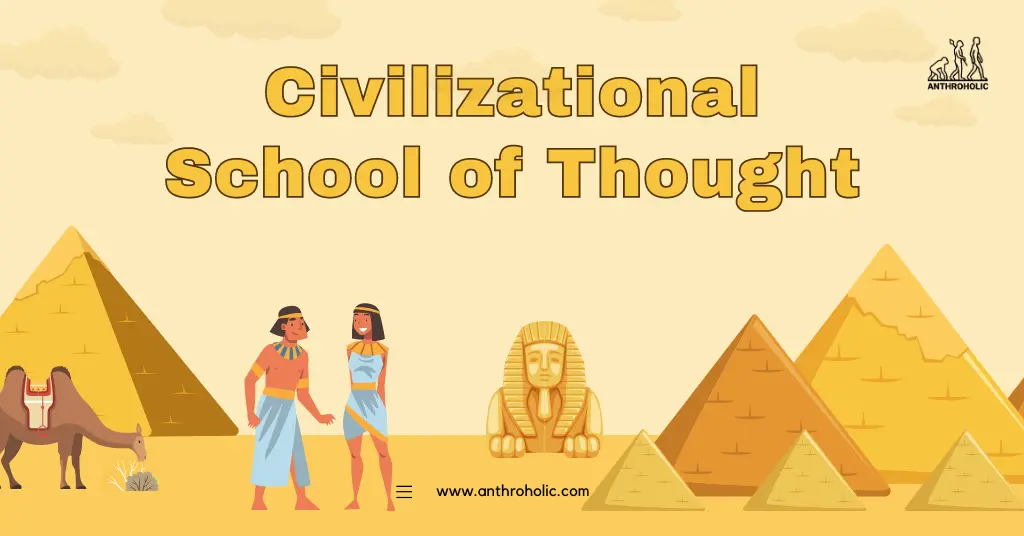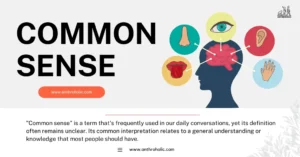AI Answer Evaluation Platform Live Now. Try Free Answer Evaluation Now
Civilizational School of Thought
The Civilizational School of Thought in anthropology offers an expansive view of cultures and societies by studying them in the context of their broader civilization. Unlike conventional approaches that may focus on specific communities or tribes, this school of thought emphasizes the shared attributes and interconnectedness of societies within a civilization.

Historical Background
The Genesis of the Concept
- Early Roots: The idea of civilization as an analytical framework dates back to the 18th century, with philosophers like Voltaire and Montesquieu laying the groundwork [1].
- 19th Century Development: Scholars such as Durkheim and Tönnies further refined the concept, associating civilization with complex societal structures [2].
- 20th Century Flourishing: The Civilizational School came into prominence in the mid-20th century with the works of authors like Arnold Toynbee, who compared civilizations through his multi-volume work, “A Study of History” [3].
Philosophical Underpinnings
- Interconnectedness of Societies: Civilizations are seen as extensive, interconnected webs of societies sharing certain core values and practices [4].
- Dynamics of Change: The concept recognizes that civilizations undergo transformation and evolution over time, often through interaction with other civilizations.
- Cultural Relativism: This school of thought often employs a non-judgmental perspective, seeking to understand each civilization on its terms without imposing external value systems.
Key Concepts
Table 1: Core Concepts of the Civilizational School of Thought
| Concept | Description |
|---|---|
| Civilization | A large, complex social structure encompassing multiple societies with shared cultural attributes. |
| Cultural Diffusion | The spread of cultural elements between civilizations, contributing to their development and transformation. |
| Clash of Civilizations | A theory postulating that future conflicts will be predominantly between civilizations rather than individual states or ideologies. |
Clash of Civilizations: Huntington’s Theory
The theory of the “Clash of Civilizations,” proposed by Samuel P. Huntington, posits that cultural and religious differences are the primary sources of conflict in the post-Cold War era. This concept represents one of the more contentious aspects of the Civilizational School and has generated significant debate and criticism.
Application in Anthropology
Comparative Studies
Civilizational analysis allows anthropologists to conduct comparative studies across different societies within a civilization or even between different civilizations. Such studies can yield insights into universal human themes and the diverse ways in which these themes are expressed.
Understanding Global Trends
By studying civilizations, anthropologists can better grasp global trends, cultural diffusion, and the influence of globalizing forces. This understanding is essential for predicting and interpreting global changes.
Bridging Gaps
The Civilizational School of Thought helps in bridging gaps between different academic disciplines, offering an interdisciplinary approach that combines history, sociology, political science, and cultural studies.
Critiques and Limitations
- Oversimplification: Critics argue that the Civilizational School may oversimplify complex cultural phenomena, reducing them to broad categories that may overlook essential nuances.
- Eurocentric Bias: Some scholars have pointed out a tendency towards a Eurocentric perspective, particularly in earlier works in this tradition.
- Potential for Stereotyping: The categorization of civilizations may lead to stereotyping, pigeonholing societies, and individuals within broad, generalized labels.
Conclusion
The Civilizational School of Thought offers a holistic view of human societies, recognizing the interconnectedness and shared attributes of civilizations. While it has enriched anthropological studies with its broad scope and comparative approach, it is not without its criticisms and limitations. Continued exploration, refinement, and critical analysis of this school of thought are vital for its future relevance and application.
References
[1] Voltaire, “Philosophical Dictionary,” 1764.
[2] Durkheim, É., & Tönnies, F., “Civilization and Society,” 1887.
[3] Toynbee, A., “A Study of History,” 1934-1961.
[4] Eisenstadt, S.N., “Multiple Modernities,” Daedalus, 129(1), 2000.




